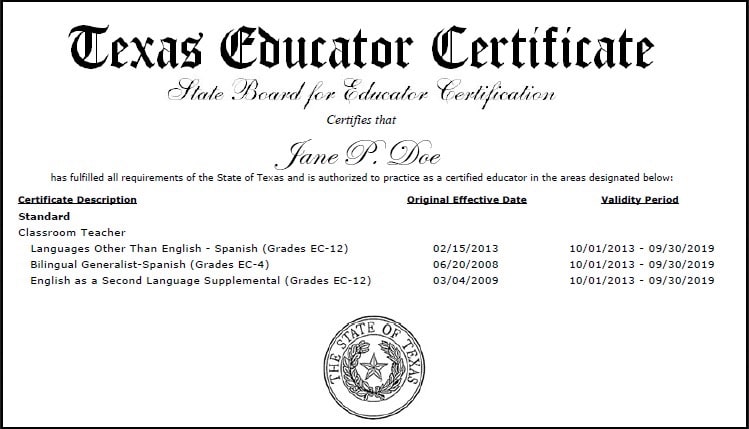The SBEC is responsible for certifying educators and establishing standards and procedures for the preparation, certification, and continuing education of public school educators in Texas.
The certification process varies from state to state, but the goal remains to ensure that educators have the necessary knowledge and skills to provide quality education to students.
This comprehensive guide will provide an in-depth look at SBEC certification, including the types of certificates available, requirements, application processes, and tips for preparing for certification exams.
Table of contents
What is SBEC Certification?
SBEC Certification stands for State Board for Educator Certification, which is the governing body responsible for certifying educators in the state of Texas.
This certification is mandatory for all teachers and other educational professionals working in public schools in Texas. SBEC Certification ensures that educators meet certain standards and qualifications to effectively teach and support students.
To obtain SBEC Certification, individuals must complete specific education and training requirements, pass exams, and undergo a background check. Once certified, educators must continue to meet ongoing professional development requirements to maintain their certification.
SBEC Certification plays a crucial role in ensuring that Texas students receive quality education from qualified professionals.
What Are The Types of SBEC Certifications?
Various SBEC certifications are categorized into two main groups: initial and advanced credentials. Within these groups are different certification areas, such as elementary education, special education, and administration.
YOU WILL ALSO LIKE: Top 10 English Teaching Certifications To Get In 2024
A. Initial Certifications
- Early Childhood-Grade 2 (EC-2)
- Grades 1-6 (Elementary Education)
- Grades 4-8 (Middle School Education)
- Grades 7-12 (Secondary Education)
- Special Education (All Grade Levels)
- English as a Second Language (ESL)/Bilingual Education
- Career and Technical Education (CTE)
B. Advanced Certifications
- Principal Certification
- Superintendent Certification
- School Counselor Certification
- Reading Specialist Certification
- Master Teacher Certification
- School Librarian Certification
What Are The General Requirements for SBEC Certification?
While specific requirements may vary depending on the type of certification and state, there are general requirements that all candidates must meet to be eligible for SBEC certification.
A. Educational Requirements
- Bachelor’s Degree: Candidates must have a bachelor’s degree from an accredited college or university. Some certifications, like CTE, may require additional coursework or degrees in specific content areas.
- Teacher Preparation Program: Candidates must complete an approved teacher preparation program, which includes both coursework and a supervised teaching experience (also known as student teaching). These programs may be part of a traditional undergraduate program, a post-baccalaureate program, or an alternative certification program.
B. Testing Requirements
- Content Area Exam: Candidates must pass a content area exam that aligns with the certification they seek. These exams are designed to test candidates’ knowledge of the subject matter they will be teaching.
- Pedagogy and Professional Responsibilities (PPR) Exam: Besides the content area exam, candidates must pass the PPR exam, which assesses their knowledge of effective teaching practices and professional responsibilities.
Background Check
Candidates must pass a criminal background check, which may include fingerprinting, to ensure they are suitable for working with children.
Application Process for SBEC Certification
The application process for SBEC certification varies by state, but it generally includes the following steps:
- Create an account with the appropriate state agency or department of education.
- Submit an application and the required documentation, such as transcripts, proof of degree completion, and teacher preparation program completion verification.
- Register for and pass the required certification exams.
- Complete the criminal background check process.
- Pay any required fees.
- Receive notification of certification approval.
YOU WILL ALSO LIKE: 10 Free Government Certifications Online in 2024
Preparing for Certification Exams
A. Study Materials
- Exam Preparation Manuals: Many state agencies provide exam preparation manuals, which include information on the exam structure, sample questions, and content areas covered. Candidates should review these manuals to familiarize themselves with the exam format and content.
- Textbooks and Course Materials: Candidates should review books and course materials from their teacher preparation programs, focusing on the content areas covered by the certification exams.
- Online Resources: Numerous websites offer study materials, practice exams, and resources to help candidates prepare for SBEC certification exams. Some websites may require a subscription or one-time fee, while others offer free resources. Examples of popular online resources include:
- Teachers Test Prep: This website offers study guides, practice tests, and tutoring services for certification exams, including SBEC exams. (https://www.teacherstestprep.com/)
- Quizlet: This platform allows users to create and share flashcards on various subjects, including SBEC exam content. Candidates can search for existing flashcard sets or create their own to study specific content areas. (https://www.quizlet.com/)
- 240Tutoring: This website offers study guides and practice tests specifically designed for SBEC exams. A subscription is required to access all resources, but some materials are free. (https://www.240tutoring.com/)
- Study.com: This platform provides video lessons, quizzes, and practice tests to help candidates prepare for SBEC exams. A subscription is required to access all resources. (https://www.study.com/)
Study Strategies
Creating a study strategy remains crucial to pass an SBEC certification exam in Texas or any other U.S. state. Below are expert study strategies you should adopt.
- Create a Study Schedule: Establishing a consistent study schedule can help candidates manage their time effectively and ensure they cover all critical content areas before taking the exam.
- Focus on Weak Areas: Candidates should identify their weak areas within the content and dedicate more time to studying those topics. We can achieve this by reviewing previous coursework, taking practice exams, or working with a tutor.
- Practice Exam Strategies: Taking practice exams can help candidates become familiar with the exam format, question types, and pacing. Additionally, practicing test-taking strategies, such as the process of elimination and time management, can improve performance on the actual exam.
- Join a Study Group: Collaborating with other candidates preparing for the same exam can provide additional support, motivation, and insight into the exam content.
- Seek Help from a Mentor or Tutor: Candidates struggling with specific content areas or needing additional guidance may benefit from working with a mentor or tutor with experience with the SBEC certification exams.
Maintaining and Renewing SBEC Certification
One thing is to obtain the SBEC certification, and another is to renew it. We have a detailed critical summary of how to do that below.
Professional Development Requirements
To maintain an active SBEC certification, educators must complete professional development hours, which vary depending on the state and certification type. These hours can be earned through activities such as attending workshops, conferences, or training related to their certification area.
SBEC certifications Renewal
SBEC certifications typically must be renewed every five years, although the specific timeframe may vary by state. To renew a certification, educators must:
- Complete the required professional development hours.
- Submit a renewal application, along with any required documentation and fees, to the appropriate state agency or department of education.
What is the SBEC-certified State of Texas?
In Texas, the State Board for Educator Certification (SBEC) certifies educators to ensure they meet the requirements to teach in public schools.
SBEC is part of the Texas Education Agency (TEA) and establishes standards and procedures for the preparation, certification, and continuing education of public school educators in Texas.
To become an SBEC-certified educator in Texas, candidates must meet specific educational requirements, pass required certification exams, and complete a background check.
The types of certifications available in Texas include initial certifications, such as Early Childhood 2, Grades 1-6, Grades 4-8, Grades 7-12, Special Education, English as a Second Language (ESL), and Career and Technical Education (CTE).
YOU WILL ALSO LIKE: What is the Largest High School in Texas, United States, 2024?
Additionally, there are advanced certifications for roles such as principals, superintendents, school counselors, reading specialists, master teachers, and school librarians.
To become SBEC-certified in Texas, candidates must:
- Hold a bachelor’s degree from an accredited college or university.
- Complete an approved teacher preparation program, including coursework and a supervised teaching experience (student teaching).
- Pass the required content area exam(s) and the Pedagogy and Professional Responsibilities (PPR) exam for their desired certification area.
- Complete a fingerprint-based criminal background check.
- Submit an application for certification to the Texas Education Agency (TEA), along with any required documentation and fees.
Upon completing these requirements, candidates will be issued an SBEC certificate, allowing them to teach in Texas public schools.
How do I become a teacher in Texas with a Foreign Degree?
To become a teacher in Texas with a foreign degree, you must follow a series of steps to ensure your degree is recognized and you meet the necessary certification requirements. Here are the steps to help guide you through the process:
Degree Evaluation
Have your foreign degree evaluated by a credential evaluation service recognized by the Texas Education Agency (TEA). This evaluation will determine if your degree is equivalent to a bachelor’s degree from an accredited U.S. institution.
You can find a list of recognized credential evaluation services on the TEA website: (https://tea.texas.gov/texas-educators)
Complete a Teacher Preparation Program
Enroll in an approved Texas teacher preparation program. These programs are designed to provide you with the necessary coursework and practical teaching experience to become an effective educator.
Depending on your qualifications and the program you choose, you may be eligible for a traditional undergraduate or post-baccalaureate program or an alternative certification program.
Pass the Certification Exams
You must pass the required certification exams for the subject area and grade level you want to teach. This typically includes a content area exam and the Pedagogy and Professional Responsibilities (PPR) exam.
Apply for a Statement of Eligibility
After completing the teacher preparation program, apply for a Statement of Eligibility with the TEA. This document indicates that you have met all certification requirements and are eligible to seek employment in Texas public schools.
Complete a Fingerprint-based Criminal Background Check
Texas requires all prospective teachers to undergo a fingerprint-based criminal background check. Follow the instructions provided by the TEA to complete this process.
Obtain a Teaching Position
Secure a teaching position in a Texas public school. Your employer will typically assist you in applying for the necessary permits or provisional certificates.
Apply for a Standard Teaching Certificate
After completing your first year of teaching, you can apply for a standard teaching certificate through the TEA. This certificate is valid for five years and can be renewed upon completing the required professional development hours.
Remember that specific requirements and processes may vary depending on your situation, so it’s crucial to consult with the TEA or your chosen teacher preparation program for the most accurate and up-to-date information.
The cost of teacher certification tests in Texas varies depending on the specific exam you are taking. There are two main types of exams for teacher certification in Texas: the Texas Examinations of Educator Standards (TExES) and the Texas Assessment of Sign Language Proficiency (TASL).
YOU WILL ALSO LIKE: What’s a Good, Maximum GPA You Can Get in High School?
How Much is the Teacher Certification Test in Texas?
The cost of teacher certification tests in Texas varies depending on the specific exam you are taking. There are two main types of exams for teacher certification in Texas: the Texas Examinations of Educator Standards (TExES) and the Texas Assessment of Sign Language Proficiency (TASL).
Here are the fees associated with the most common TExES tests:
- TExES Core Subjects EC-6 or 4-8: $116
- TExES Content Area Tests (e.g., Mathematics, Science, Social Studies, etc.): $116
- TExES Pedagogy and Professional Responsibilities (PPR) EC-12: $116
- TExES English as a Second Language (ESL) Supplemental: $58
- TExES Bilingual Supplemental: $58
For the TASL test, which is required for some educators working with deaf and hard-of-hearing students, the fee is $164.
Please note that these fees are subject to change, and additional fees may apply for late registration, rescheduling, or other circumstances.
It is recommended to check the Texas Educator Certification Examination Program website (http://www.tx.nesinc.com/) for the most current and accurate fee information.
Can you Teach in Texas Without a Certification?
Texas generally requires teachers to be certified to teach in public schools. However, some circumstances exist where individuals may be allowed to teach without a certification, such as in charter schools or through a temporary permit or emergency certification. Here are some examples:
Charter Schools
Charter schools in Texas have more flexibility in hiring practices than traditional public schools. They may not employ certified teachers with specific qualifications, such as a bachelor’s degree and expertise in a specific subject area.
However, charter schools must still employ a minimum percentage of certified teachers, depending on the school’s performance.
Temporary Permit
In some cases, individuals with a bachelor’s degree who have not yet completed a teacher preparation program may be eligible for a temporary permit, which allows them to teach under the supervision of a certified teacher while they complete their certification requirements. This option is generally limited to areas with a critical shortage of certified teachers.
Emergency Certification
In situations with a critical shortage of certified teachers, a school district may request an emergency certification for an individual with a bachelor’s degree but no teaching certification. This emergency certification is valid for one school year.
It may be renewed if the individual is enrolled in an alternative certification program and progressing toward completing the certification requirements.
Teach for America (TFA)
Teach for America is a nonprofit organization that places recent college graduates and professionals in low-income schools to teach for at least two years.
TFA participants are not required to be certified at the beginning of their service. Still, they must be enrolled in an alternative certification program and work toward completing their certification requirements while with TFA.
It is important to note that these exceptions are not the norm, and most teaching positions in Texas public schools will require certification.
However, if you are interested in teaching without certification, exploring the specific requirements and options for charter schools or alternative certification programs in your area is recommended.
Frequently Asked Questions
Most people usually need 9 to 12 months to finish an alternative teaching certificate through Teachers of Tomorrow in Texas.
On a scale from 100 to 300, total exam performance scores are published for all exams in the AAFCS, PACT, and TExES series, with a minimum passing score of 240.
Most instructors receive biweekly pay on a 10-month timetable, while some may choose to participate in a scheme called Year Round Pay that spreads earnings out over 12 months. A few specialized teaching positions have a 12-month work cycle and are paid accordingly. One year’s worth of wages is given to teachers.
Attending A+ Texas Teachers ranges from $2,000 to $5,000, depending on the qualification, with a median cost of $3,000.
Conclusion
Obtaining an SBEC certification is essential for individuals seeking to become educators in the United States.
By understanding the types of certifications available, meeting the requirements, and preparing effectively for certification exams, candidates can set themselves up for success in their teaching careers.
Remember that the certification process may vary by state, so it is essential to research the specific requirements and procedures for your desired certification area and location. With dedication, preparation, and persistence, achieving SBEC certification is a reachable goal for aspiring educators.
References
- Bestaccreditedcolleges.org – What is an SBEC certification in teaching?
- Tea.texas.gov – State Board for Educator Certification




